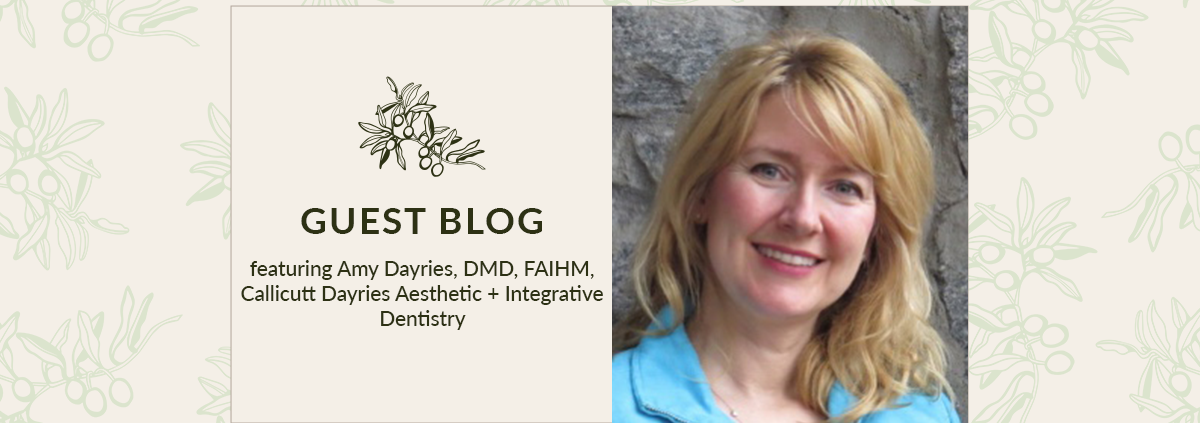Holistic Steps For Improving Your Child’s Dental Health
By Amy Dayries, DMD, FAIHM
As a dentist practicing for the last 25 years in Roswell, I’ve observed so many health connections between oral health and the overall health of the body. Much of my own learning about points mentioned in this article came to me while raising my own children and seeking new solutions when there were health struggles in our home.
My daughter, Sarah, suffered a traumatic injury at the age of four years old, which required her to receive stitches in her chin. After the injury, I noticed that she began regularly snoring and breathing through her mouth. She reverted to needing afternoon naps, and temper tantrums became a regular occurrence, when we should have developmentally been progressing towards being ready for a full day of kindergarten.
My daughter also wished to begin violin lessons, and we found that whatever breakfast she would eat just before the lesson would have a profound impact on her ability to focus and reach success during the teaching session. She had her first baby teeth loosening up and great big permanent teeth erupting in her mouth, and as a dentist, I could see that she would have ever so much crowding. Her seasonal allergies were becoming a year round issue.
I needed answers so that my beautiful beloved daughter could become the best version of herself. As I looked for solutions that would support her, I found that many of these issues were connected. Even more surprising for me was the discovery that all of the issues Sarah was experiencing could be connected through dental health. What an exciting epiphany this was for me as both a mom and a dentist!
There are also so many changes happening in dentistry, which make the importance of knowing the dental health status of your child even more crucial. This article will focus on the importance of diet and sleep, connecting these issues with oral health.
Sleep and the Developing Face
As a child’s face develops, both internal and external changes yield to their continued physical, mental, and emotional growth.. These are signs of possible issues with sleep that can be seen in the developing face of a child:
- Asymmetry
- Positioning of the ears- ears that protrude outwards or where one is much higher/ lower than the other
- Focus of the eyes, whites of the eyes showing either above or under the iris (colored part of the eye)
- Dark circles under the eyes, narrow lower third of face
- Asthma
- Swollen tonsils and adenoids
- Snoring
- Bedwetting at night (Nocturnal enuresis)
- Slouching
- History of traumatic birth or head trauma in a child
- Mouth breathing regularly
- Stomach issues/ gas/ bloating after dinner/ at night
- Tongue tie/ picky eater/ speech difficulties
- Anterior open bite (almost unheard of in dental literature of 100 years ago is now increasingly prevalent)
The Connection Between Crowded Teeth and Sleep
In order for there to be proper spacing for permanent teeth, there should be space between all baby teeth.
Sleep issues will impact the body’s ability to heal, grow, and thrive. In children, it is especially impactful to address signs and symptoms and determine if poor sleep could be a contributing factor. Once corrected, a child is able to come more fully online and develop into their fullest potential. Kids with crowded teeth are more likely to be mouth breathers, and also have higher rates of decay, as it is easier to pack food stuck between teeth. There is also a change in the bacterial flora of the mouth when mouth breathing is regularly occurring, causing increased likelihood of decay.
Increasingly, mainstream dental groups such as the American Dental Association are embracing the new movement toward treating whole body health from the dental chair, as we dentists frequently see warning signs of overall health issues such as poor sleep in routine dental appointments.
How the parent can impact their child’s sleep and ability to focus
We now also realize that dietary issues, left unaddressed, can also impact oral health. In dentistry, we see poor formation of enamel, called enamel hypoplasia, and thus higher rates of oral decay from gluten intolerance that is unrecognized. Gluten sensitivity can also contribute to the feeling of brain fog or inability to focus.
Dental decay is also influenced by habitual mouth breathing and low levels of vitamins D, A, and K2. Blood levels of calcium and phosphorus will also impact decay levels. Some of this information was discovered through medical research decades ago, but we need more awareness about the connections between dental decay rates and the deeper meaning of what may be occurring in the child’s overall health. The teeth tell the story of the overall health of the body.
Here are some steps parents can take to become more aware of their child’s oral and systemic health:
- Be actively involved in night time oral cleaning routines. Help your child age 7 and younger brush and floss teeth. Question if you do not see spacing between the baby teeth. This can indicate future crowding issues, which may also indicate a reduced airway size.
- Educate your child. Take them grocery shopping to encourage them to try new, nutritious foods, and discuss with them the advertising and packaging ploys of modern marketing that may attract the child’s eye towards fake non-nutritious food choices.
- Consider gardening simple seasonal vegetables, herbs, or fruits if possible. Seasonal produce is a wonderful way to change up one’s diet and also obtain the most nutritional value from the foods you ingest.
- Involve your child in meal preparation. Have the child be able to try new foods and express their preferences. Be aware that a picky eater is often the child who actually is suffering from a tongue habit where certain muscle segments of the tongue are underworking, and some segments are overworking.
- Determine if your child would benefit from Myo-functional therapy. This is a program that addresses both speech impediments and also establishes ways for a child to convert to what we in the dental industry call a mature swallow- where the tongue graces the palate and stimulates fuller development of the maxilla (upper jaw). Adults with a mature swallow have increased heart rate variability, a sign of better cardiovascular health. The vagus nerve innervates both the tongue and the heart, and thus the function of the tongue is closely related to heart function.
- Observe how your child breathes during the day and while sleeping. For the chronic mouth breather, here is something you can try tonight to ease sleep:
- Limit dairy products and sugar at night-time meals, particularly after 2 years of age. Dairy and sugar at later meals will break down in the gut and cause bloating, gas, and increased nasal congestion, contributing to the need to breathe more easily through the mouth, rather than through the nose.
- Practice yoga breaths with your child before bed to open up nasal passages and calm nerves to encourage nasal breathing. Even Elmo on Sesame Street has a little video on YouTube called Belly Breathe, which is a fun way to teach a child how to handle stressful situations and also can be a way to coach how to breathe while falling asleep at night.
-
- Establish a night-time routine.
- Take a steam bath with a drop or two of lavender oil (to soothe and promote relaxation) or sip on a warm decaffeinated cup of herbal tea such as chamomile or lemon balm. Focus on inhaling the steam from the cup. For younger children, a steamy bath may be an easier way to accomplish this step. The steam will help loosen up congestion.
- Have your child blow their nose. Clean out as much mucus as possible. You may also opt to use a Xylitol-based nasal product or a Neti pot (not a pharmaceutical decongestant, so many fewer side effects) to assist with getting nasal passages lubricated and free of congestion.
- Consider taping your child’s mouth closed with some band aid adhesive. This should never be done on an infant. Please inquire with your child’s dentist about the safety of this so you are not working this journey alone. Perhaps tape your own mouth shut and your child’s too during the day as a sort of activity to try while watching television or playing to establish if this is a workable endeavor to try at night. Investigate some of the online educational opportunities available such as Patrick McKeown’s Buteyko Breathing International, or even his Ted Talk to further educate yourself on the importance of nasal breathing.
- Establish a night-time routine.
- Taking supplements or multivitamins may help achieve an optimal balance of nutrition for better growth outcomes and health. If there is a history of much chronic disease in family history (heart disease, diabetes, mental health, anxiety), you may consider seeking salivary or blood test ing with your child’s doctor for testing for gene Single Nucleotide Polymorphisms that can help determine optimal vitamin supplementation that will be best absorbed by your child.
- For the younger toddler or baby, try to breastfeed until about the age of 2 years old. Babies have to work harder to nurse than to sip from a bottle. Nursing when possible helps formation of the skull and encourages development of a mature swallow. Switch to harder, crunchy foods as teeth erupt in the mouth. Historically, humans ate harder foods rather than the Standard American Diet (SAD). It is increasingly appreciated in the world of dentistry that the SAD can contribute to a reduced airway development, increased crowding of teeth, increased need for future orthodontics, and increased rate of dental decay.
It has been said that it takes a village to raise a child. As you can see from the many suggestions above, there are many ways we parents can begin to positively impact our children’s facial, oral, and airway development. It may be that much of this is accomplished in the home, but there are also many health care providers that can offer support. I encourage you to ask questions, as there are many solutions available once you know how symptoms can connect and become interlaced.
For me, my daughter Sarah is now a college student pursuing a music major with her violin. She has been an honor roll student and was able to avoid braces as a teenager. I attribute much of her reaching high standards to the fortunate support we found as we began to ask questions to figure out why she snored, why she had dental crowding and was having temper tantrums and focus issues. I am grateful for the discoveries we made as a family, and hope that there are some ideas presented here that may help other parents looking for answers.
Our Roswell dental office serves children and adults alike, and we are growing! The ideas presented here are applicable to all age groups. The functional orthodontic appliances we use in our office can help develop a small windpipe and straighten teeth. We also see that these appliances can help restore better sleep, and some of our patients have graduated from the need to use a c-pap or bi-pap appliance while sleeping.
If you would like to be seen for a consultation with me, feel free to contact me, Dr. Amy Dayries, at (770)753-0067. Learn more at CallicuttDayries.com.


